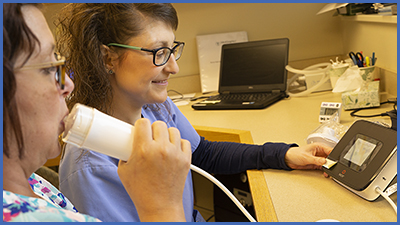January 28, 2020 -Recruitment and Screening for PrecISE Clinical Study Opens

Major milestone reached in novel clinical trial applying precision medicine to severe asthma treatment
Participant recruitment and screening for the PrecISE clinical study is now underway, starting at two locations: Brigham and Women’s Hospital and the University of Wisconsin – Madison. This milestone marks the beginning of efforts to recruit a total of 800 adults and teenagers (ages 12 and older) from over 30 locations in the US and the United Kingdom. (View the full list of locations here.)
“We were very excited to screen our first patients for the PrecISE study,” Dr. Elliot Israel, director of the Brigham and Women’s Hospital Severe Asthma Program and Professor of Medicine at Harvard Medical School, said. “Patients are also excited about being able to be treated with multiple different approaches to see if one works better for them than others.”
New treatments for severe asthma will be evaluated in the PrecISE study using a novel approach called precision medicine. Each participant will be profiled using the results of blood tests, genetic tests, airway function tests, and other bits of information, called biomarkers. These biomarkers help researchers understand what treatments work best for certain types of patients.
PrecISE also uses an adaptive trial design. Adaptive trials are designed to change their parameters over time as data are gathered throughout the study. PrecISE researchers chose to use precision medicine and an adaptive trial design to help address the fact that many patients with severe asthma don’t tend to respond well to the treatments that are currently available.
“[People living with severe asthma] are patients who, despite the fact that we’ve given them most of the common medications that we know to use to treat asthma, they still are not completely cured,” Dr. Israel said. “We are very enthusiastic about being able to understand which treatments work best for different types of patients.”
The study is funded by the National Heart, Lung, and Blood Institute (NHLBI), part of the National Institutes of Health (NIH).
“NHLBI is excited to have enrollment begin in the PrecISE Network, NIH’s first adaptive design, precision medicine trial for severe asthma,” Patricia Noel, PhD, NHLBI program director and the study’s program officer, said. “We’re looking forward to new insights into the treatment of severe asthma through this novel program.”
25 million people in the US are living with asthma, including 6 million children, according to Centers for Disease Control and Prevention data from 2017. About 10-15 percent of them are living with severe asthma, a condition where symptoms like coughing, wheezing, chest tightness, and difficulty breathing are more frequent. See more in this video on living with severe asthma.
Resources
- See a list of all PrecISE study site locations
- View a short video from PrecISE: Living with Severe Asthma

